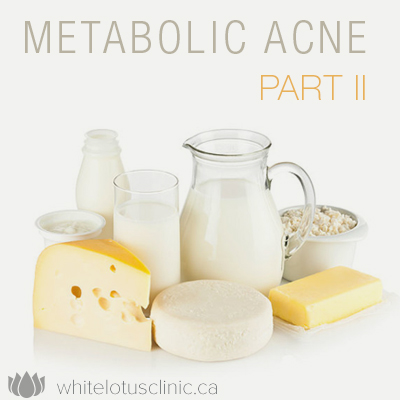Metabolic Acne Part 2- Diet and Nutritional Interventions
In the last article we discussed how your adult acne may not be a function of your reproductive hormones, but instead your metabolic hormones. This is especially true of nodular, cystic acne that sits along the cheeks, and jaw line. Here we talked about how insulin and IGF-1 can be intricately related to skin cell overgrowth, sebum production and skin pigmentation changes.
At this point you have likely tested your insulin levels, or have a good idea that insulin resistance may be at play for you. So now, what do you do about it?
When it comes to addressing acne diet has a huge role to play!

Cut The Dairy
I have long been told that sugar and dairy caused acne. I feel like these sentiments are something that people have accepted for decades, but no one ever explained to me why this was. After letting my inquisitive mind go I began to find a pattern in the research. Both of these foods, dairy and carbohydrates, are able to spike insulin levels after you eat them. Milk and dairy products additionally increase the signalling and sensitivity to IGF-1/insulin and increase sebum lipogenesis through derepression of the androgen reception1,2.
Essentially, dairy products are a double whammy for inflammation and hormone imbalance in the skin. They should be avoided in an effort to improve skin, and metabolic health.
Focus on Consuming Plenty of Healthy Fats, and Lower Your Carbohydrate Consumption.
In a similar fashion to the discussion of dairy, there is nothing quite like sugar and carbohydrates to stimulate insulin1. Carbohydrates include not only processed sugar but also things like fruits, vegetables (especially potatoes, squash, beets etc) and grains. Each of these food stimulate insulin to a different degree, and it is about decreasing the overall demand on insulin, not eliminating every one of these food groups.
Substituting the satiating effects of carbohydrates with the satiating effects of fat is my favorite way to lower my insulin demand, whilst still feeling full, satisfied and craving free between meals. This can be done by adding ½ of an avocado, a handful of nuts, or extra olive or coconut oil to a dish.
I want to make something clear here, I talk a lot about insulin, but it is not an inherently ‘bad’ hormone. We need insulin to be healthy, but it is important that we have the right amount of insulin and that the pancreas is able to respond appropriately to meals. Insulin also shuttles amino acids into muscles, it helps us store appropriate amounts of fat, and keeps our liver chocked full of storage fuel so that we can go prolonged periods without food but still maintain our energy levels. All good things!
Try out Apple Cider Vinegar
The skeptic in me did not believe this when I heard it! Apple cider vinegar (ACV) can decrease insulin levels? It could not be true I thought! So of course I dug into the research. It turns out to be true.
Research suggests that 20g of ACV can increase your insulin sensitivity 19-34%, lowering both the insulin and glucose response to a high carbohydrate meal 3. Another study showed improvements in insulin and glucose levels with the addition of 2tbsp of ACV before meals4. Additionally, it has been shown to improve AM fasting glucose levels when taken at night 5. These results have been repeated in numerous studies in both humans and animals, so it was enough to catch my attention!
The side benefit to ACV is that it can also stimulate the digestive process, helping with indigestion, bloating and other unpleasant GI issues. This also makes it inappropriate for people with certain types of reflux as it can increase the acidity of your stomach!
PS: ACV and water also makes a nice toner for oily skin. What does this stuff not do?
This is a Great Start!
Although there are plenty of supplements and other gastrointestinal health considerations when it comes to addressing insulin resistance and adult acne, starting with diet changes can be one of the most impactful interventions. You truly cannot supplement or run your way out of a diet that is not suited to your metabolism!
Take Action Now!
As I have noted throughout, acne is not just a skin issue. I often tell patients that your skin is simply a manifestation of what is happening internally. If you have cyclical acne, it likely represents a change in your hormones. The same is true of chronic cystic acne. In this case, insulin resistance can progress into significant blood sugar dysregulation, or even diabetes. It is a sign of something bigger.
If you take anything out of this article, I encourage you to listen to your bodies signals, get proper testing done, and implement the strategies that could change your future health (and your current confidence levels)!
References
- Napolitano, M., Megna, M. & Monfrecola, G. Insulin resistance and skin diseases. ScientificWorldJournal. 2015, 479354 (2015).
- Kumari, R. & Thappa, D. M. Role of insulin resistance and diet in acne. Indian J. Dermatol. Venereol. Leprol. 79, 291–299 (2013).
- Johnston, C. S., Kim, C. M. & Buller, A. J. Vinegar Improves Insulin Sensitivity to a High-Carbohydrate Meal in Subjects With Insulin Resistance or Type 2 Diabetes. Diabetes Care27, 281 LP-282 (2003).
- Ostman, E., Granfeldt, Y., Persson, L. & Bjorck, I. Vinegar supplementation lowers glucose and insulin responses and increases satiety after a bread meal in healthy subjects. Eur. J. Clin. Nutr. 59, 983–988 (2005).
- White, A. M. & Johnston, C. S. Vinegar Ingestion at Bedtime Moderates Waking Glucose Concentrations in Adults With Well-Controlled Type 2 Diabetes. Diabetes Care 30, 2814 LP-2815 (2007).




